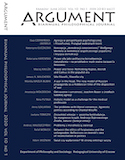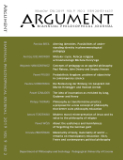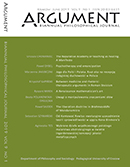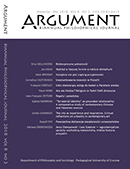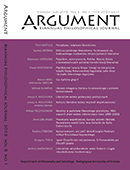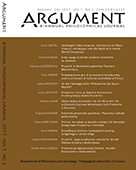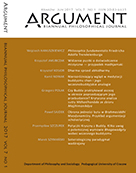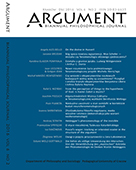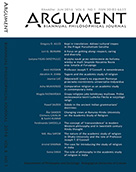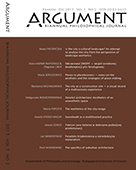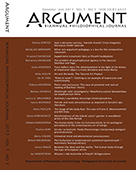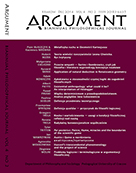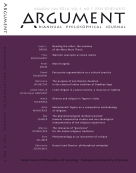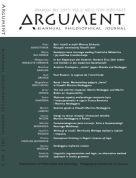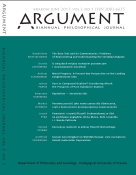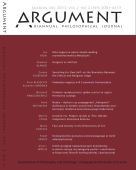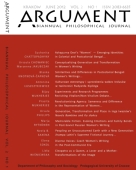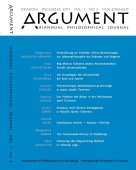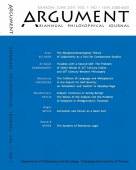DOI 10.24917/20841043.8.2
Kraków, December 2018, volume 8, number 2
CONTENTS

Leading theme of the issue:
Paris 8 (1968-2018): 50 years of philosophical commitments
thematic eds. Luc Leguérinel & Renata Niziołek
co-eds. Wojciech Hanuszkiewicz & Paweł Sznajder

Editor’s introduction
Introduction to the issue (Wojciech HANUSZKIEWICZ, ORCID, Paweł SZNAJDER, ORCID)
Articles
Zoltán SOMHEGYI, ORCID, The city as experience and inspiration. Critical reflections on urbanity in contemporary art (DOI 10.24917/20841043.8.2.1)
Abstract
In this paper I am proposing to investigate some possible connecting points between art,
aesthetics and the urban experience, more precisely how the perception and experience of the city as well as the features of urban life can inspire artists. At the same time, I am also curious how artworks can be used to understand this urban experience, as well as how they can be interpreted as not only simple descriptions and depictions, but also as active contributionsand modes of suggesting solutions to the most pressing issues of contemporary cities and of city life. Hence my primary aim is discussing some approaches towards the aesthetic analyses of urbanity through modern and contemporary examples. In this way I am focusing less on how the city appears as a mere motive in artworks, or how it is used as main object or background element indicating the context in representations; and I am also not aiming to provide a survey analyses of the numerous ideas of the aesthetics of urbanity. Instead of these, here I am concentrating on how urbanity and the experiencing of the city(life) in itself as well as its multifaceted aspects can become a source of inspiration and at the same time a critically analysed subject, i.e. a concept that is examined through the work itself.
Keywords: art and the city; aesthetics of urban experience; inspiration from the city(life); critiques of urban transformation; city and place
Pavel HONS, ORCID, Are we Hindus? Religion in Tamil Dalit discourse (DOI 10.24917/20841043.8.2.2)
Abstract
Based primarily on original sources in Tamil as well as interviews, the article seeks to portray the attitude of Tamil Dalit intellectuals and political leaders towards the question of religion. It seeks to discover the role of religion in their discourse and how they utilise religious matters to mobilise their fellow caste members. It maps their efforts to distance themselves from Hinduism and to propagate the particularity of Dalit deities and Dalit religion as a part of their newly constructed identity. Their opinions on the possibility of conversion are also briefly noted. These attitudes are examined from the viewpoint of the differing emancipation strategies of the three major Tamil Dalit castes. The Paraiyar as well as the Arunthaiyar leaders try to reject the Hindu identity, though the common folk consider themselves to be Hindus. The Devendrars on the contrary associate themselves with the Hindu gods and Hindu temples, they claim direct connection with some of them. Even they, however, tend to emphasise particularity of their deities as a part of their identity building.
Keywords: Dalits; Hinduism; Hindu identity; Indian culture; religion
Sydney MORROW, ORCID, “Terrestrial Identity” as Grounded Relationality: A Comparative Study of Contemporary Chinese and Hawaiian Sources (DOI 10.24917/20841043.8.2.3)
Abstract
In this essay, I discuss a potential nexus for comparison between Hawaiian and Chinese philosophies grounded in what I call “terrestrial identity”. I bring Fei Xiaotong’s (1910–2005) description of the formation of social identity in China, which is historically agrarian and inalienably place-based, to meet contemporary Hawaiian philosophical perspectives of personal responsibility (kuleana), genealogical (moʻokūʻauhau) consciousness, and “seascape epistemology” (Ingersoll, 2016) to flesh out a new theory of relationality, one that includes the ontological, historical, and ethical relationship of humans to the land on which they orient themselves and that defines the circumstances of their lives. The concept of terrestrial identity is inclusive in terms of types of relational entities, accommodating place, space, and memory into a comprehensive social ontology. It also opens onto discussions of contemporary social problems in a way that centres place and contextuality. I will conclude this essay with such a discussion, regarding homelessness among Kānaka Maoli (Native Hawaiians).
Keywords: Chinese philosophy; Hawaiian philosophy; social patterns; comparative philosophy; crosscultural philosophy; Fei Xiaotong
Jan BIGAJ, ORCID, Wykład w lżejszej formie w tekście Metafizyki (DOI 10.24917/20841043.8.2.4)
Abstract
A light-hearted lecture in the text of Metaphysics: Two chapters 7 and 8 of Book 7 in Metaphysics contain notes from three lectures on the topic of generation. At the beginning, a couple of remarks are made on the theme of biological procreation, which is taken up again in the repeat lecture summed up in chapter 9. This lecture is given in a light-hearted form, with sometimes frivolous allusions to the matter of sex. If one does not take into account this aspect (as it is usually done), the text becomes unintelligible.
Keywords: Aristotle; metaphysics; generation
Adriana ZIMNOWODA, ORCID, Jerzy Stempowski i Lew Szestow – egzystencjalizm spowity wschodnią melancholią. Krótka historia przyjaźni (DOI 10.24917/20841043.8.2.5)
Abstract
Jerzy Stempowski and Lev Shestov — existentialism imbued with eastern melancholy. A short history of a friendship: The main objective of this article is to present the friendship between Jerzy Stempowski — Polish writer, essayist and Lev Shestov — Russian writer and philosopher. The article consist of three parts an and short conclusion. In the first part I focus on Stempowski’s predilections for Eastern Europe, and I also explore Stempowski’s complicated, though clearly evident, relation with existentialism. It is in this context that I show both Stempowski’s close affinity with Shestov philosophy, and his evident antipathy to French existentialism. In the second part I attempt to answer the following question: why did Stempowski have such a strong aversion to Albert Camus’ work. In this part of my essay I briefly refer to a Serbian writer and dissident — Mihajlo Mihajlov. In the third part I explore Stempowski’s friendship with Shestov and I also sketch the ideological horizon they both shared. Moreover, I mention Shestov’s presentations at the philosophical conferences in Kraków and Berlin as well as his meeting with Edmund Husserl in Amsterdam. In the short conclusion to my article I suggest that Stempowski’s existentialism is an individual, original project even if his existentialism draws upon most of the major themes in philosophical treatises and literature of existentialism. His “existential project” is based on: 1. reason which rationally orders reality, 2. sympathy towards antirational and prophetic philosophy of Russian thinkers which he analyses from the positions of a professed atheist and 3. deeply-rooted humanistic values.
Keywords: Russian existentialism; French existentialism; Mihajlo Mihajlov; Albert Camus; Fiodor Dostoevsky; reason; irrationality; absurd; the tragic; pessimism
* * *
Translations into Polish
Paris 8 (1968-2018): 50 years of philosophical commitments
Introduction to the thematic papers of the issue. Paris 8 (1968-2018): 50 years of philosophical commitments (Luc LEGUÉRINEL, ORCID, thematic editor)
Jean-François LYOTARD, Reguły i paradoksy (Trans. Sonia KOPEĆ, Adrian LEGUÉRINEL) (DOI 10.24917/20841043.8.2.6)
Keywords and acknowledgements
Keywords: postmodernism; grand narratives; language; rules; paradoxes
Acknowledgement: Lyotard, J.-F. (2009). Règles et paradoxes. Cahiers critiques de philosophie, 9, 163–169.
Cornelius CASTORIADIS, Uwarunkowania nowości w filozofii (Trans. Halina CHMIEL-BOŻEK) (DOI 10.24917/20841043.8.2.7)
Keywords and acknowledgements
Keywords: autonomy; freedom; closure; break out of closure; newness; truth
Acknowledgement: Castoriadis, C. (2008). Les conditions du nouveau en philosophie. Cahiers critiques de philosophie, 6, 43–62.
François CHÂTELET, Szkic stanowiący wstęp do badań o Państwie wiedzy (Trans. Ewelina MITERA) (DOI 10.24917/20841043.8.2.8)
Keywords and acknowledgements
Keywords: state; power; society
Acknowledgement: Châtelet, F. (2007). Brouillon pour une introduction à l’étude de l’État savant. Cahiers critiques
de philosophie, 4, 163–181. 1st ed.: Cazenave, A. & Lyotard, J. F. (Ed.). (1985). Mélanges Gandillac. L’art des confins. Paris: PUF.
Driss BELLAHCÈNE, Niebezpieczna pobożność (Trans. Daniel PAŃSKI) (DOI 10.24917/20841043.8.2.9)
Keywords and acknowledgements
Keywords: piety; fanaticism; Islam; fundamentalism; tolerance
Acknowledgement: Bellahcène, D. (2005). La piété dangereuse. Cahiers critiques de philosophie, 1, 23–40.
Alain BROSSAT, Szczęście nie jest częścią przyjemności (Trans. Łukasz ŚWIERCZYŃSKI) (DOI 10.24917/20841043.8.2.10)
Keywords and acknowledgements
Keywords: happiness; level of happiness; friendship; pleasure; Michel Foucault
Acknowledgement: Brossat, A. (2016). Le Bonheur n’est pas une partie de plaisir. Cahiers critiques de philosophie,
15, 9–22.
Zespół XVII, Powszechna deklaracja niezależności uniwersytetów (Trans. Przemysław SZCZUR) (DOI 10.24917/20841043.8.2.11)
Keywords and acknowledgements
Keywords: independence of universities; freedom of scientific research; mission of university
Acknowledgement: Groupe XVII. (2009). Déclaration d’indépendance des universités. Cahiers critiques de philosophie, 8, 221–224.
* * *
Review articles & polemics
Kristina KHUTSISHVILI, ORCID, Between nothing and a promise of eternity. Reading Alain Badiou’s Black (DOI 10.24917/20841043.8.2.12)
Wojciech HANUSZKIEWICZ, ORCID, Od Fichtego do Kanta i z powrotem. Kilka uwag o Marka J. Siemka idei transcendentalizmu (DOI 10.24917/20841043.8.2.13)
Reports
Andrzej SERAFIN, ORCID, Jak nauczać platonizmu? Sprawozdanie z letniej szkoły „Akademia Platońska” w Lanckoronie
Contributors


